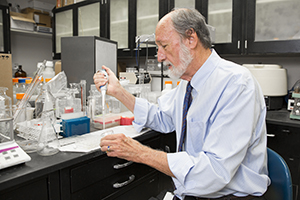K is for Energy
Research finds certain vitamins can improve energy and health

Ted Reid, Ph.D.
Aged cheese and cows grazing on green grass have a connection that researchers have found may give humans more energy.
When cattle eat green grass they obtain vitamin K1, which bacteria in their rumen modifies to vitamin K2. Additional K2 is obtained in the process of cheese production, specifically aged cheese. Humans also get some vitamin K2 from bacteria in their intestine.
However, Ted Reid, Ph.D., professor in the Texas Tech University Health Sciences Center (TTUHSC) Departments of Ophthalmology and Visual Science, Chemistry and Biochemistry and Immunology and Molecular Microbiology, said today, cattle don’t feed on grass as much, therefore, humans are not getting sufficient vitamin K2 for health benefits.
“Researchers have known for years that vitamin K1 and K2 are important to a person’s health,” Reid said.
Vitamin K1 is important because it works in a cycle to donate protons and plays a role in blood clotting and the regulation of calcium and metabolism. Vitamin K1 is absorbed in the small intestine and is localized in the liver.
“However, when Americans became concerned with the negative health risks of eating dairy products and certain foods, many began to cut out cheese and milk, cutting out much of the vitamin K2 needed for good health,” Reid said.
Although eating dairy and other calcium supplements was found to develop calcium plaque in arteries causing heart attacks, women need more of it because of osteoporosis. This is the paradox for women. They need more calcium but it can lead to heart attacks.
“The problem is lack of vitamin K2,” Reid said. “Vitamin K2 is required for the removal of calcium from arteries and veins and its transport to the bones where you need it, which is important for women and men. This is the answer to the paradox.”
It also turns out that vitamin K (both K1 and K2) also does other important things in the body. Reid said it is important to know how vitamin K works in the body.
Back in the 1950s and 1960s, researchers looked for answers as to how vitamin K2 might interact with mitochondria, which are organelles that supply energy to the body.
Now, years later, Reid revisited vitamin K2 in collaboration with Cintergia. Mitochondria use oxygen in body to produce energy.
Reid explained that mitochondria were from ancient bacteria taken up by cells eons ago. Remnants of these bacteria now function to produce energy in your body. One of the molecules they produce is Adenosine 5'-triphosphate (ATP), which is the principal molecule for storing and transferring energy in cells. Without mitochondria, you could not lift a finger.
“We found that vitamin K2 allows you to make more ATP,” Reid said. “When you measure ATP production you can see the oxygen consumption capacity of a cell. We found that addition of vitamin K2 to cells in culture improved their oxygen consumption ability by 60 percent.”
In another collaborative study with the University of North Texas, findings confirmed, when vitamin K2 is added to a human diet, energy capacity can actually go up.
The study at North Texas looked at 19 young volunteers and gave them vitamin K2 supplements for 6 weeks. When the volunteers were then tested, their cardiac output improvement was equivalent to 6 months of extensive physical training.
In this study, participants were given vitamin K2 supplements. But Reid said other sources for vitamin K2 include aged cheeses, organ meats like chicken liver, salami and egg yolks.
Related Stories
Celebrating Veterans: TTUHSC’s General Martin Clay’s Legacy of Service and Leadership
From his initial enlistment in the Army National Guard 36 years ago to his leadership in military and civilian health care management roles, Major General Martin Clay’s career has been shaped by adaptability, mission focus and service to others.
Texas Tech University Health Sciences Center School of Nursing Named Best Accelerated Bachelor of Science in Nursing Program in Texas
The TTUHSC School of Nursing Accelerated Bachelor of Science in Nursing (BSN) program has been ranked the No. 1 accelerated nursing program in Texas by RegisteredNursing.org.
TTUHSC Names New Regional Dean for the School of Nursing
Louise Rice, DNP, RN, has been named regional dean of the TTUHSC School of Nursing on the Amarillo campus.
Recent Stories
The John Wayne Cancer Foundation Surgical Oncology Fellowship Program at Texas Tech University Health Sciences Center Announced
TTUHSC is collaborating with the John Wayne Cancer Foundation and has established the Big Cure Endowment, which supports the university’s efforts to reduce cancer incidence and increase survivability of people in rural and underserved areas.
TTUHSC Receives $1 Million Gift from Amarillo National Bank to Expand and Enhance Pediatric Care in the Panhandle
TTUHSC School of Medicine leaders accepted a $1 million philanthropic gift from Amarillo National Bank on Tuesday (Feb. 10), marking a transformational investment in pediatric care for the Texas Panhandle.
Texas Tech University Health Sciences Center Permian Basin Announces Pediatric Residency Program Gift
TTUHSC Permian Basin, along with the Permian Strategic Partnership and the Scharbauer Foundation, Feb. 5 announced a gift that will fund a new pediatric residency.
